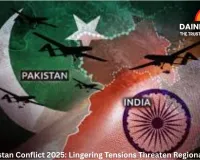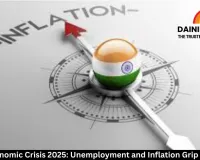‘I Love Muhammad’ Chants: Crackdown or Security Measure? A Test of India’s Commitment to Free Expression
Digital Desk

In recent days, Uttar Pradesh has witnessed the arrest of hundreds of individuals for chanting “I Love Muhammad” during public gatherings. The move, initiated by the BJP-led state government, has sparked a nationwide debate: is this a justified security measure aimed at maintaining communal harmony, or a disturbing sign of shrinking space for free expression in India’s democracy?
The Incident and the Crackdown
The controversy began when videos surfaced showing crowds chanting “I Love Muhammad” during religious processions in several UP districts. Local authorities quickly labelled the gatherings “provocative,” claiming they had the potential to trigger communal tension. Soon after, police began arresting participants under charges related to disturbing public order and promoting enmity between groups.
Officials argue the crackdown was preventive, not punitive. “No one is being targeted for their faith,” said a senior police officer. “Our action is against those using religion to incite unrest.” The BJP government defends the move as part of its zero-tolerance policy toward anything that could inflame communal sentiments.
Voices of Dissent and Accusations of Bias
However, critics see it differently. Opposition leaders, rights activists, and minority organizations allege that the arrests reflect selective enforcement and religious profiling. They argue that similar expressions from members of the majority community rarely face comparable police action.
“This is not law and order—it’s intimidation,” said a social activist based in Lucknow. “If people can shout political slogans freely, why is saying ‘I Love Muhammad’ suddenly a threat to public peace?”
The All India Muslim Personal Law Board and several civil rights groups have condemned the police action, calling it a direct assault on the constitutional right to freedom of speech and religion.
Hashtags like ILoveMuhammad and FreedomToPray have trended online, with thousands expressing solidarity and accusing the government of silencing minority voices.
Free Expression vs. Public Order
The issue underscores a deeper conflict between state power and individual liberty. India’s Constitution guarantees freedom of expression, but this right is not absolute—it can be curtailed in the interest of public order. The problem, experts argue, lies in the uneven application of this principle.
When slogans, prayers, or statements of faith are policed selectively, it raises concerns about institutional bias and the weaponization of law enforcement. In a democracy as diverse as India, equating religious expression with provocation risks alienating entire communities and eroding trust in governance.
The Chilling Effect on Dissent
Beyond arrests, the broader worry is the chilling effect such actions create. When citizens fear expressing their beliefs, democracy begins to suffocate. The space for dialogue shrinks, and polarization deepens. For a nation that celebrates “unity in diversity,” this crackdown sends a troubling message.
Whether viewed as a security measure or suppression of minority sentiment, the Uttar Pradesh episode has reignited debate about India’s democratic values. True national harmony cannot be built through fear or selective punishment it must rest on mutual respect and the freedom to express faith without fear.
In the world’s largest democracy, saying “I Love Muhammad” should not be treated as a crime it should be respected as an expression of belief.



.jpg)







